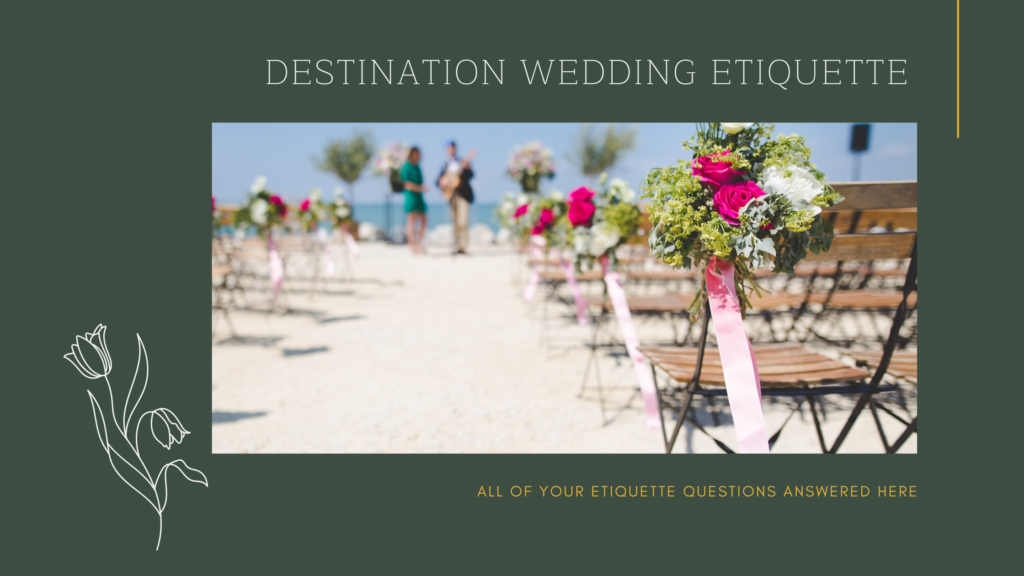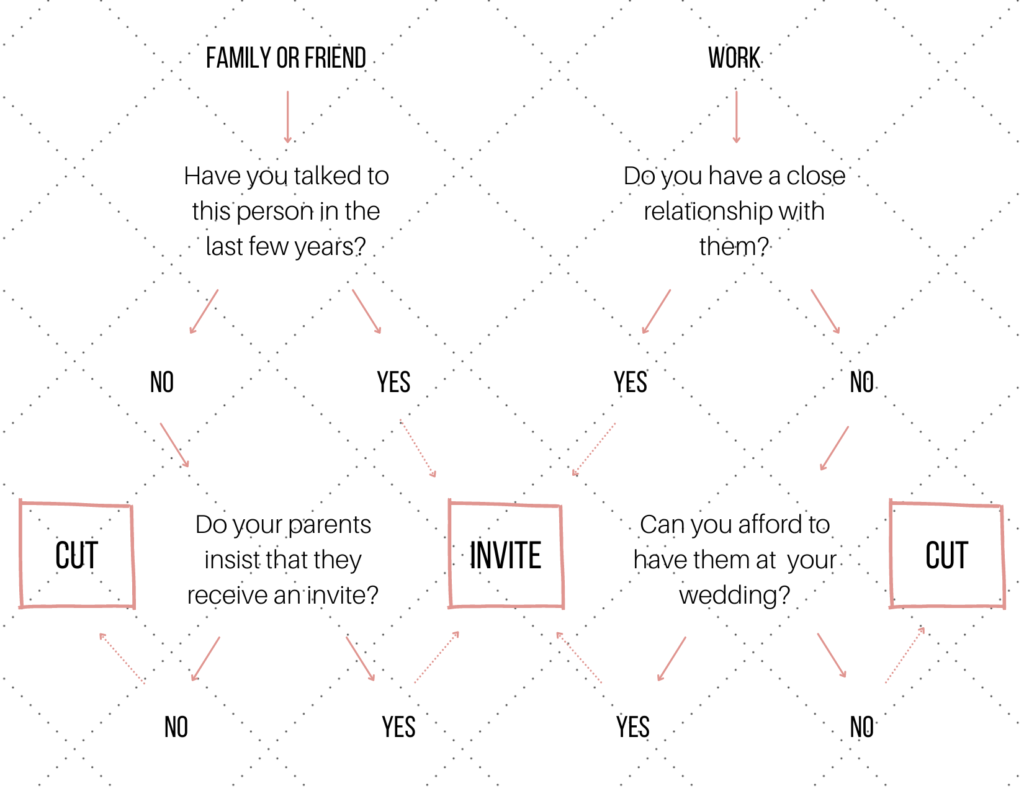
Navigating a destination wedding can be tricky for a few reasons. For one, destination weddings are a relatively new concept that couples have been choosing over the last several years, which means the resources are scarce. Planning a traditional wedding can seem like a cake walk when that’s what most people are accustomed to. Secondly, because of the limited resources, a lot of brides are left trying to decide several destination wedding etiquette questions they have and don’t want to seem inconsiderate or rude based on their decisions.
For example, should you send your save the dates and invitations a lot earlier because your guests will need time to save? Should you and your fiance pay for an excursions or travel accommodations because it’s more expensive for your guests? We’ll go over these situations and much more below.
Because there are multiple questions we’re tackling in this post we’ve linked each question below to the answer further down the page. A lot of these questions we also have separate blog posts for that go even further into detail. Each one is linked in the corresponding section.
The Most Common Destination Wedding Etiquette Questions:
Who pays for the destination wedding?
Who do you invite to your destination wedding?
When should you send your save-the-dates and invitations?
Do you have a bridal shower?
What does your wedding party expect from you?
Are your guests expecting you to have a welcome dinner or cocktail hour?
Do you tip if it’s an all-inclusive resort?
Paying for the destination wedding
Let’s start with one of the biggest questions you’ll see regarding a destination wedding. Who pays? For years it’s been a general rule of thumb that the bride’s family pays for the ceremony and dress and the groom’s family pays for the rehearsal dinner. But this is following traditional wedding guidelines and times have changed.
With a destination wedding the financial aspect is very different and is usually all built into one bill. And these days you don’t really see parents paying for specific aspects of the wedding. If you do receive money, it’s more likely that they’ll just give you a lump sum of cash to do with as you and your fiancé please.
What if your parents aren’t happy about your destination wedding? Well, either way, you and your fiancé should be budgeting to not expect to receive monetary help from family. Of course anything that is received is a huge help financially, but there’s nothing worse than expecting money to come in, planning for it by booking more than you can afford, and then not receiving it.
Who do you invite?
The easy answer? Whoever you want! It’s your wedding so it should ultimately be your decision. Unfortunately, sometimes it isn’t that easy. There can be pressure from family members or friends to invite more than you expected. So how to do you decide? See the invite guide below:

If you get to the end of the guide and answer yes to either question then they should receive an invite. If the answer is no then don’t worry about sending them one.
Still feeling guilty if you answered no? Consider inviting them to your stateside reception (if you’re having one). They’ll still be included in the wedding festivities, but you won’t feel as much guilt or burden for not inviting them to anything.
When should you send save-the-dates & invitations?
Another very common destination wedding etiquette question. You’d like to give your guests ample time to save for the trip, but may not have every detail figured out just yet.
As a general rule of thumb, you should send your save the dates out 12 to 18 months before the wedding. This gives your friends and family time to save money, figure out which days to take off of work, and start looking at pricing for their flight and resort.
For invitations – it’s best to send them out 8 months before the wedding. Some of your guests may have already booked their trip at this point, but for those who haven’t it really makes sure they get on it. This is still plenty of time to get everything they need in order.
What to include with each?
Save the dates:
- Your wedding website (this will include instructions on how to book and information about the resort)
- Your travel agent’s contact information
- The reservation and payment due date
Invites:
- Resort name and location
- Travel agent’s name and contact information
- Reservation and payment due date
- Your wedding website with instructions on how to book
- RSVP information (their booking can be a informal RSVP as well)
- Stateside reception information (if you’re having one)
- Gift information (for those who won’t attend but want to send you a gift)
We have a blog post, “The Ultimate Save-the-Date and Invite Guide for Your Destination Wedding” that goes into more detail if you’re looking for additional guidance on this.
Check out sites like Etsy and Pinterest to get some destination wedding invitation inspiration.
Do you have a bridal shower?

A lot of destination wedding brides debate if they should have a bridal shower at all. So much so that we’ve created an entirely different blog post about it. Check out our post, “Should You Have a Bridal Shower for your Destination Wedding? 4 Things to Consider” to help answer these questions.
If you don’t have time to check it out, we’ll summarize here. In short, just because you’re having a destination wedding doesn’t mean you aren’t deserving of having a bridal shower.
Follow up question: who do you invite to the bridal shower? We recommend anyone you’ll also be inviting to the wedding. It’s in poor taste to invite someone to an event where they’re required to bring a gift for you, but not invite them to the wedding itself.
Asking your wedding party
A lot of destination wedding brides feel pressure in asking their wedding party and worry about their expectations for the destination wedding in general. Some brides think their wedding party is going to expect them to pay for their trip or attire, or be upset that you’re deciding to have a destination wedding.
What do they expect from you?
Most destination wedding brides receive nothing but support and excitement from their wedding party. Sure, you hear horror stories of that friend who expects you to pay for their trip or decides last minute if they’re coming or not, but it’s pretty rare. What do you do if either of those happens? Discuss with your fiance what you’ll do if either case comes up so you have a plan of action.
If you’re deciding to have a destination wedding because it’s a more affordable option then paying for a guest’s accommodations is going to make a big dent in your budget. Make sure you and your fiance are on the same page regarding proceeding with your wedding even if someone from your wedding party can’t afford to come.
Their attire expectations
Just like a traditional wedding, your wedding party should be responsible for purchasing their own attire. On the plus side, a destination wedding offers much more versatility than your typical rented suit and bridesmaid dress, so it can be cheaper for your wedding party.
Need help deciding what your groomsmen should wear? Check out our post, “Beach Wedding Groom Attire Ideas (And Best Places to Shop).”
Welcome dinner or cocktail hour

A really nice way to get all your guests acquainted with each other and see all of them is to host a welcome dinner or cocktail hour at the resort. Are your guests expecting it? No, so don’t feel pressure to have one if you don’t want.
Should you pay for this? Yes. If you and your fiance are planning it and inviting people to it then you should be paying for that event. The level of planning can vary as well. If you just want a casual cocktail hour at the lobby bar this information can be put on your itinerary (“Why an Itinerary for your Destination Wedding Guests is Important”) and left for the guest to decide if they want to attend. If you’d like a welcome dinner make sure the resort and on-site coordinator are aware so they can help you plan.
Tipping
This is another common destination wedding etiquette question that we’ve created a separate post for as well. Our post, “Tipping Guide for Your Destination Wedding” goes over tipping guidelines for a destination wedding. Here’s an overview:
If you’re ever wondering in general if you should tip just remember the following:
Vendor/employee working for themselves – no tip
Vendor/employee working for the resort – tip
Most brides follow this guideline for their wedding and it works out pretty well. If the vendor or employee is working alone (any outside vendors like a photographer, DJ, florist, hair and makeup artist, etc.) they generally don’t expect a tip. If the vendor/employee works for the resort (resort photographer, service employees, bartenders, resort hair and makeup artist, wedding coordinator, etc.) you may want to consider tipping them.
Want to know how much to tip or which vendors you may not be considering? Check out that post for more information.
Destination wedding etiquette shouldn’t scare you. There are no hard and fast rules when it comes to planning your dream wedding. The biggest thing to remember is to base your wedding planning decisions on being considerate of your guests. As long as you are, you’re probably just fine with any decision you make.
Destination wedding etiquette can be a confusing topic to navigate, but we hope we helped answer some of your questions with this post. Were there any topics you wish we would have gone over that we didn’t discuss? Comment below or contact me here!
